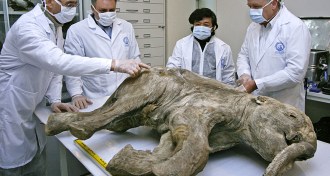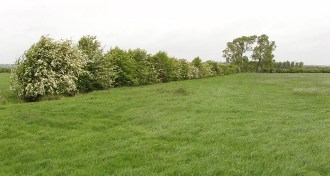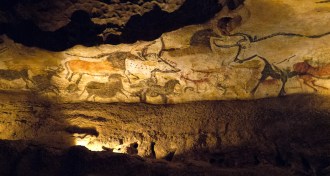Reviews
-
 Genetics
GeneticsExtinct species may get a second chance
An evolutionary biologist explains the obstacles scientists must overcome to revive extinct species.
-
 Plants
PlantsThe art and science of the hedgerow
Spiky hawthorn trees have found many uses despite their unforgiving nature, Bill Vaughn writes in ‘Hawthorn.’
By Nathan Seppa -
 Science & Society
Science & SocietyHistories left behind by the dispossessed
‘Dispatches from Dystopia’ chronicles adventures in modernist wastelands to recount tales of the invisible and the overlooked, the exiled and the dispossessed.
By Sid Perkins -
 Astronomy
Astronomy‘Black Hole’ traces 100 years of a transformative idea
Implied by general relativity and proven by astronomical discoveries, black holes’ existence took decades for physicists to accept.
-
 Planetary Science
Planetary ScienceExplore an asteroid with ‘Vesta Trek’
Vesta Trek lets users explore the asteroid Vesta with data from the Dawn spacecraft.
-
 Math
MathResearch can’t be right with ‘Statistics Done Wrong’
Fraud in science gets a lot of attention and condemnation — as it should. But fraud isn't that interesting compared to all the errors that scientists commit unintentionally.
-
 Tech
Tech‘Ex Machina’ explores humanity as much as AI
Sci-fi thriller delves into hubris and power relationships.
By Eva Emerson -
 Chemistry
ChemistryA chemistry card game forges bonds
A new card game lets players brush up on chemistry by making compounds out of ions. Form some bonds and have fun in the process.
-
 Science & Society
Science & SocietyExpedition’s plants illustrated, build your own robot, and more
Three museum exhibits allow visitors to explore 18th century botanical art, natural disasters and robots.
-
 Animals
AnimalsTales of the bedbug, one of the world’s most reviled insects
‘Infested’ captivates with stories about the bloodsucking insects. Resurgent in many areas in the United States, bedbugs are the fastest-growing moneymaker in pest control.
By Sid Perkins -
 Health & Medicine
Health & MedicineApple’s ResearchKit wants your health data
Apple seeks recruits for health studies. But with uncertain measurements and lots of effort required to participate, the desire to help research may extend only so far.
-
 Animals
Animals‘Domesticated’ explores how humans have altered animals
Science journalist Richard Francis delves into the genetic changes humans have caused in dogs, cats, pigs, horses, camels and more.